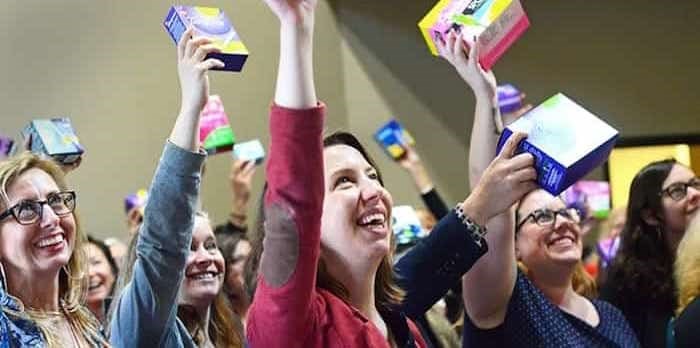 Participants in the United Way of the Lower Mainland’s Tampon Tuesday campaign hold up donated tampons, pads and diva cups at a wrap-up event at the United Way’s Burnaby headquarters in March 2018. Photograph by CORNELIA NAYLOR
Participants in the United Way of the Lower Mainland’s Tampon Tuesday campaign hold up donated tampons, pads and diva cups at a wrap-up event at the United Way’s Burnaby headquarters in March 2018. Photograph by CORNELIA NAYLOR
Vulnerable women across British Columbia can now access free menstrual products as part of a B.C. Government funded research project aimed at finding a solution to “period poverty.”
The Province teamed up with United Way to launch the Period Promise research project, which hopes to find a way to ensure women in need have ongoing access to tampons and pads.
The Period Promise campaign has already raised awareness and helped create change in the province for women. In April, the B.C. Government declared that all public schools will be required to provide free menstrual products for students by the end of 2019.
Now, 12 non-profits will provide free tampons and pads to clients as of this month, until July 2020, thanks to a one-off $95,000 B.C. Government grant.
The project, launched on July 10, will collect data on the number of people seeking help and products used. It will also track how the lack of access to menstrual products affects people’s lives.
Nikki Hill, co-chair of the Period Promise campaign, said the simple truth is that people who can’t afford menstrual products are often going to community agencies to find them, and sometimes they just aren’t available.
“The government’s commitment to work with the United Way Period Promise campaign shows that they get it, and that they are looking for solutions that will make access to tampons and pads easier for everybody who needs them,” she said.
One of the non-profits involved, Kiwassa Neighbourhood House on Oxford Street, said the initiative will help reduce menstruation stigma and contribute toward greater equality for women, trans and non-binary people.
“We hope that facilitating access to free menstruation products will reduce barriers faced by community members needing to access support and live with dignity,” Barbara Wood, Kiwassa Neighbourhood House board president, said.
Shane Simpson, Minister of Social Development and Poverty Reduction, said period poverty creates barriers and leaves people isolated.
“This research will help us better understand how we can create solutions that will make a difference," he said.
Free products will be available to clients of the 12 non-profits until July 2020.
The report from the research project will be presented to government in December 2020.


